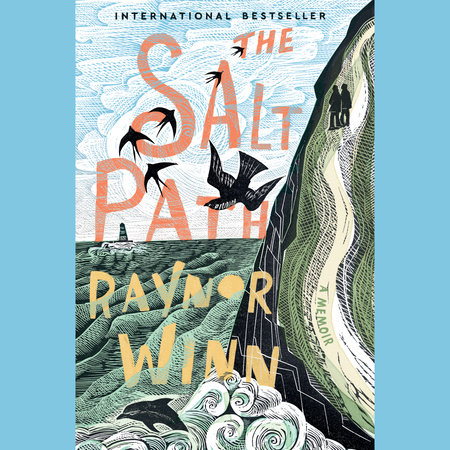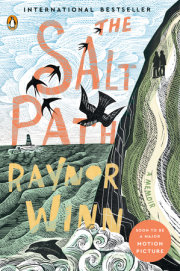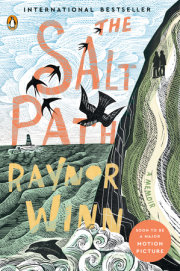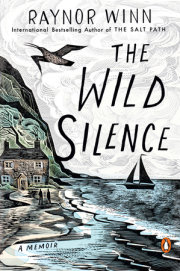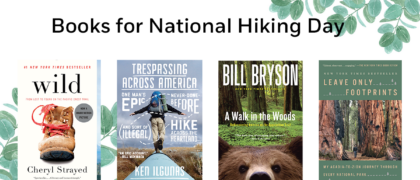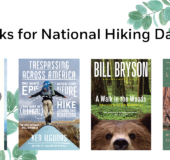Dust of Life I was under the stairs when I decided to walk. In that moment, I hadn’t carefully considered walking 630 miles with a rucksack on my back, I hadn’t thought about how I could afford to do it, or that I’d be wild camping for nearly one hundred nights, or what I’d do afterward. I hadn’t told my partner of thirty-two years that he was coming with me.
Only minutes earlier, hiding under the stairs had seemed a good option. The men in black began hammering on the door at 9 a.m., but we weren’t ready. We weren’t ready to let go. I needed more time: just another hour, another week, another lifetime. There would never be enough time. So we crouched together under the stairs, pressed together, whispering like scared mice, like naughty children, waiting to be found.
The bailiffs moved to the back of the house, banging on the win- dows, trying all the catches, looking for a way in. I could hear one of them climbing onto the garden bench, pushing at the kitchen skylight, shouting. It was then that I spotted the book in a packing box. I’d read
Five Hundred Mile Walkies in my twenties, the story of a man who walked the South West Coast Path with his dog. Moth was squeezed in next to me, his head on his knees, his arms wrapped around in self-defense, and pain, and fear, and anger. Above all anger. Life had picked up every piece of ammunition pos- sible and hurled it at him full force, in what had been three years of endless battle. He was exhausted with anger. I put my hand on his hair. I’d stroked that hair when it was long and blond, full of sea salt, heather and youth; brown and shorter, full of building plaster and the kids’ play dough; and now silver, thinner, full of the dust of our life.
I’d met this man when I was eighteen; I was now fifty. We’d rebuilt this ruined farm together, restoring every wall, every stone, growing vegetables and hens and two children, creating a barn for visitors to share our lives and pay the bills. And now, when we walked out of that door, it would all be behind us, everything behind us, over, finished, done.
“We could just walk.”
It was a ridiculous thing to say, but I said it anyway. “Walk?”
“Yeah, just walk.”
Could Moth walk it? It was just a coastal path after all; it couldn’t be that hard and we could walk slowly, put one foot in front of the other and just follow the map. I desperately needed a map, some- thing to show me the way. So why not? It couldn’t be that difficult. The possibility of walking the whole coastline from Minehead in Somerset through north Devon, Cornwall and south Devon to Poole in Dorset seemed just about feasible. Yet, in that moment, the idea of walking over hills, beaches, rivers and moorland was as remote and unlikely to happen as us getting out from under the stairs and opening the door. Something that could be done by some-
one else, not us.
But we’d already rebuilt a ruin, taught ourselves plumbing, brought up two children, defended ourselves against judges and highly paid lawyers, so why not?
Because we lost. Lost the case, lost the house and lost ourselves.
I reached out my hand to lift the book from its box and looked at the cover:
Five Hundred Mile Walkies. It seemed such an idyllic prospect. I didn’t realize then that the South West Coast Path was relentless, that it would mean climbing the equivalent of Mount Everest nearly four times, walking 630 miles on a path often no more than a foot wide, sleeping wild, living wild, working our way through every painful action that had brought us here, to this moment, hiding. I just knew we should walk. And now we had no choice. I’d reached out my hand toward the box and now they knew we were in the house, they’d seen me, there was no way back, we had to go. As we crawled from the darkness beneath the stairs, Moth turned back.
“Together?”
“Always.”
We stood at the front door, the bailiffs on the other side waiting to change the locks, to bar us from our old lives. We were about to leave the dimly lit, centuries-old house that had held us cocooned for twenty years. When we walked through the door, we could never ever come back.
We held hands and walked into the light.
Copyright © 2019 by Raynor Winn. All rights reserved. No part of this excerpt may be reproduced or reprinted without permission in writing from the publisher.

